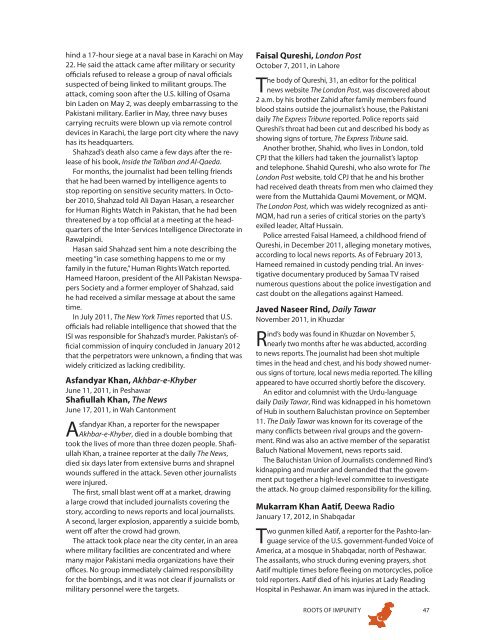CPJ.Pakistan.Roots.of.Impunity
CPJ.Pakistan.Roots.of.Impunity
CPJ.Pakistan.Roots.of.Impunity
Create successful ePaper yourself
Turn your PDF publications into a flip-book with our unique Google optimized e-Paper software.
hind a 17-hour siege at a naval base in Karachi on May<br />
22. He said the attack came after military or security<br />
<strong>of</strong>ficials refused to release a group <strong>of</strong> naval <strong>of</strong>ficials<br />
suspected <strong>of</strong> being linked to militant groups. The<br />
attack, coming soon after the U.S. killing <strong>of</strong> Osama<br />
bin Laden on May 2, was deeply embarrassing to the<br />
<strong>Pakistan</strong>i military. Earlier in May, three navy buses<br />
carrying recruits were blown up via remote control<br />
devices in Karachi, the large port city where the navy<br />
has its headquarters.<br />
Shahzad’s death also came a few days after the release<br />
<strong>of</strong> his book, Inside the Taliban and Al-Qaeda.<br />
For months, the journalist had been telling friends<br />
that he had been warned by intelligence agents to<br />
stop reporting on sensitive security matters. In October<br />
2010, Shahzad told Ali Dayan Hasan, a researcher<br />
for Human Rights Watch in <strong>Pakistan</strong>, that he had been<br />
threatened by a top <strong>of</strong>ficial at a meeting at the headquarters<br />
<strong>of</strong> the Inter-Services Intelligence Directorate in<br />
Rawalpindi.<br />
Hasan said Shahzad sent him a note describing the<br />
meeting “in case something happens to me or my<br />
family in the future,” Human Rights Watch reported.<br />
Hameed Haroon, president <strong>of</strong> the All <strong>Pakistan</strong> Newspapers<br />
Society and a former employer <strong>of</strong> Shahzad, said<br />
he had received a similar message at about the same<br />
time.<br />
In July 2011, The New York Times reported that U.S.<br />
<strong>of</strong>ficials had reliable intelligence that showed that the<br />
ISI was responsible for Shahzad’s murder. <strong>Pakistan</strong>’s <strong>of</strong>ficial<br />
commission <strong>of</strong> inquiry concluded in January 2012<br />
that the perpetrators were unknown, a finding that was<br />
widely criticized as lacking credibility.<br />
Asfandyar Khan, Akhbar-e-Khyber<br />
June 11, 2011, in Peshawar<br />
Shafiullah Khan, The News<br />
June 17, 2011, in Wah Cantonment<br />
Asfandyar Khan, a reporter for the newspaper<br />
Akhbar-e-Khyber, died in a double bombing that<br />
took the lives <strong>of</strong> more than three dozen people. Shafiullah<br />
Khan, a trainee reporter at the daily The News,<br />
died six days later from extensive burns and shrapnel<br />
wounds suffered in the attack. Seven other journalists<br />
were injured.<br />
The first, small blast went <strong>of</strong>f at a market, drawing<br />
a large crowd that included journalists covering the<br />
story, according to news reports and local journalists.<br />
A second, larger explosion, apparently a suicide bomb,<br />
went <strong>of</strong>f after the crowd had grown.<br />
The attack took place near the city center, in an area<br />
where military facilities are concentrated and where<br />
many major <strong>Pakistan</strong>i media organizations have their<br />
<strong>of</strong>fices. No group immediately claimed responsibility<br />
for the bombings, and it was not clear if journalists or<br />
military personnel were the targets.<br />
Faisal Qureshi, London Post<br />
October 7, 2011, in Lahore<br />
The body <strong>of</strong> Qureshi, 31, an editor for the political<br />
news website The London Post, was discovered about<br />
2 a.m. by his brother Zahid after family members found<br />
blood stains outside the journalist’s house, the <strong>Pakistan</strong>i<br />
daily The Express Tribune reported. Police reports said<br />
Qureshi’s throat had been cut and described his body as<br />
showing signs <strong>of</strong> torture, The Express Tribune said.<br />
Another brother, Shahid, who lives in London, told<br />
<strong>CPJ</strong> that the killers had taken the journalist’s laptop<br />
and telephone. Shahid Qureshi, who also wrote for The<br />
London Post website, told <strong>CPJ</strong> that he and his brother<br />
had received death threats from men who claimed they<br />
were from the Muttahida Qaumi Movement, or MQM.<br />
The London Post, which was widely recognized as anti-<br />
MQM, had run a series <strong>of</strong> critical stories on the party’s<br />
exiled leader, Altaf Hussain.<br />
Police arrested Faisal Hameed, a childhood friend <strong>of</strong><br />
Qureshi, in December 2011, alleging monetary motives,<br />
according to local news reports. As <strong>of</strong> February 2013,<br />
Hameed remained in custody pending trial. An investigative<br />
documentary produced by Samaa TV raised<br />
numerous questions about the police investigation and<br />
cast doubt on the allegations against Hameed.<br />
Javed Naseer Rind, Daily Tawar<br />
November 2011, in Khuzdar<br />
Rind’s body was found in Khuzdar on November 5,<br />
nearly two months after he was abducted, according<br />
to news reports. The journalist had been shot multiple<br />
times in the head and chest, and his body showed numerous<br />
signs <strong>of</strong> torture, local news media reported. The killing<br />
appeared to have occurred shortly before the discovery.<br />
An editor and columnist with the Urdu-language<br />
daily Daily Tawar, Rind was kidnapped in his hometown<br />
<strong>of</strong> Hub in southern Baluchistan province on September<br />
11. The Daily Tawar was known for its coverage <strong>of</strong> the<br />
many conflicts between rival groups and the government.<br />
Rind was also an active member <strong>of</strong> the separatist<br />
Baluch National Movement, news reports said.<br />
The Baluchistan Union <strong>of</strong> Journalists condemned Rind’s<br />
kidnapping and murder and demanded that the government<br />
put together a high-level committee to investigate<br />
the attack. No group claimed responsibility for the killing.<br />
Mukarram Khan Aatif, Deewa Radio<br />
January 17, 2012, in Shabqadar<br />
Two gunmen killed Aatif, a reporter for the Pashto-language<br />
service <strong>of</strong> the U.S. government-funded Voice <strong>of</strong><br />
America, at a mosque in Shabqadar, north <strong>of</strong> Peshawar.<br />
The assailants, who struck during evening prayers, shot<br />
Aatif multiple times before fleeing on motorcycles, police<br />
told reporters. Aatif died <strong>of</strong> his injuries at Lady Reading<br />
Hospital in Peshawar. An imam was injured in the attack.<br />
ROOTS OF IMPUNITY 47


